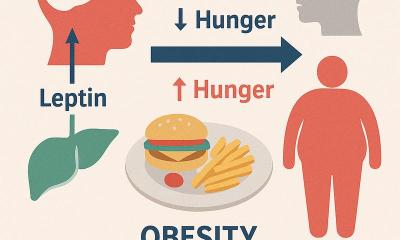
Source: Pixabay/mohamed_hassan
News • Obesity
People should focus more on fitness over weight loss
The prevalence of obesity around the world has tripled over the past 40 years, and, along with that rise, dieting and attempts to lose weight also have soared. But according to a review article, when it comes to getting healthy and reducing mortality risk, increasing physical activity and improving fitness appear to be superior to weight loss.
The authors say that employing a weight-neutral approach to the treatment of obesity-related health conditions also reduces the health risks associated with yo-yo dieting. "We would like people to know that fat can be fit, and that fit and healthy bodies come in all shapes and sizes," says co-author Glenn Gaesser of the College of Health Solutions at Arizona State University. "We realize that in a weight-obsessed culture, it may be challenging for programs that are not focused on weight loss to gain traction. We're not necessarily against weight loss; we just think that it shouldn't be the primary criterion for judging the success of a lifestyle intervention program."
"This is especially important when you consider the physiological realities of obesity," says co-author Siddhartha Angadi of the School of Education and Human Development at the University of Virginia. "Body weight is a highly heritable trait, and weight loss is associated with substantial metabolic alterations that ultimately thwart weight loss maintenance."
Obesity is associated with a number of health conditions, including cardiovascular disease, diabetes, cancer, and problems with the bones and joints. But weight cycling, commonly called yo-yo dieting, is also associated with health problems, including muscle loss, fatty liver disease, and diabetes. The authors say that by focusing on fitness rather than weight loss, people can gain the benefits of exercise while avoiding the risks associated with weight cycling.
Current public health guidelines recommend that adults accumulate 150–300 minutes per week of moderate-intensity physical activity (the intensity equivalent to walking at casual-to-brisk pace) or 75–150 minutes per week of vigorous-intensity physical activity (the intensity equivalent to jogging or running). "But it's important to note that the benefits of exercise are dose dependent, with the biggest benefits coming from just moving out of the couch-potato zone to doing at least some moderate-intensity activity," Gaesser says. "It's also important to emphasize that physical activity can be accumulated throughout the day. For example, multiple short walks during the day (even as short as two to ten minutes each) are just as beneficial as one long walk for health benefits."
In the review, the authors cite recent research focused on the magnitude of mortality risk reduction associated with weight loss compared to that associated with an increase in physical activity or cardiorespiratory fitness. The risk reduction associated with increasing fitness and physical activity was consistently greater than that associated with intentional weight loss. They also looked at the magnitude of reduction in the risk markers of cardiovascular disease that are associated with either weight loss or increased physical activity. They used meta-analyses from several studies done over a range of time periods and across a broad geographical area. "Science has generally supported the main points proposed in Big Fat Lies, a book on this topic that I first published in 1996," Gaesser notes.
The researchers acknowledge limitations in the existing body of research, including the fact that this field is heavily reliant on epidemiological studies that do not definitively establish cause and effect, and note that only large, randomized, controlled clinical trials can fully examine the outcomes of using a fitness-focused approach to optimize cardiometabolic mortality risk in people who are obese. "Collectively, however, these epidemiological studies demonstrate strong and consistent associations, and this is why meta-analyses can be useful," Angadi says. "In the case of physical activity and fitness, the epidemiological evidence is supported by a large body of experimental studies and randomized controlled trials that have established plausible mechanisms for the consistent findings in epidemiological studies."
The research was published in the journal iScience.
Source: Cell Press
21.09.2021





